Archive for March, 2018
‘What Were You Wearing?’ art exhibit kicks off Sexual Assault Awareness Month events
Thursday, March 29th, 2018An art installation titled “What Were You Wearing?” will be on display for one week at The University of Toledo to kick off a series of events for Sexual Assault Awareness Month.
The free exhibit hosted by UT’s Title IX Office is open to the public from 9 a.m. to 5 p.m. Monday, April 2 through Friday, April 6 in Carlson Library Room 1005.
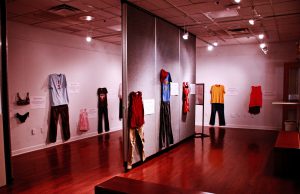
Photo by Jennifer Sprague, The University of Kansas
“What Were You Wearing?” is a collection of 24 survivors’ stories and recreations of the outfits they were wearing at the time of their assaults. The goal of the “What Were You Wearing?” project is to debunk the common rape myth that sexual violence happens because someone dresses a certain way or that they are “asking for it.”
UT President Sharon L. Gaber will speak at the opening reception for the exhibit 10:30 a.m. Monday, April 2.
The exhibit has been presented on campuses across the U.S. since it was created in 2013 and changes at each campus based on the submissions of the survivors of sexual assault in each location.
“This exhibit corresponds with Sexual Assault Awareness Month and the national conversation about what victims were wearing,” Gaber said. “Across the country, we are seeing gymnasts courageously stand up for their leotards after others publicly and wrongly blame their clothing as a cause for sexual abuse. The powerful exhibit at The University of Toledo should help all of us to move away from placing fault and shame on the victims of sexual violence and instead place the responsibility on those who cause harm.”
“Clothing has nothing to do with sexual assault,” said Donald Kamm, director of Title IX and Compliance at UT. “The exhibit provides a tangible response to one of culture’s greatest sexual assault myths.”
Other events planned for Sexual Assault Awareness Month throughout April include:
Monday, April 2
- Sexual Assault Awareness Jeopardy from noon to 1 p.m. in Carlson Library Room 1005. Hosted by the YWCA Hope Rape Crisis Center, UT’s campus advocate will lead a trivia game on sexual assault awareness facts to learn more about the issue of sexual assault and resources on campus.
Monday, April 2 through Friday, April 6
- Red Flag Campaign. Hosted by the Title IX Office, red flags will be displayed in Centennial Mall to represent the 316 individuals who reported rape in the city of Toledo in 2016.
Tuesday, April 3
- Interpersonal Violence from noon to 1 p.m. in Carlson Library Room 1005. The presentation is hosted by sexual assault nurse examiners at The University of Toledo Medical Center.
Wednesday, April 4
- Bringing in the Bystander from noon to 1:30 p.m. in Carlson Library Room 1005. Title IX leaders at UT will explore different strategies to help a friend or acquaintance by safely intervening in instances of sexual violence, relationship violence or stalking.
Thursday, April 5
- Safe Place Training from 12:30 to 3:30 p.m. in Carlson Library Room 1005. A Safe Place is a confidential place free from homophobia, transphobia, bipohobia and heterosexism where people who identify as lesbian, gay, bisexual, pansexual, asexual, transgender, genderqueer, non-binary, queer or questioning can feel welcome, safe and included. During Safe Place Training, which will be hosted by the Office of Multicultural Student Success, participants are provided information on common issues and challenges faced by LGBTQ+ individuals, what it means to be an LGBTQ Ally, and international, national, state, local and UT resources.
Tuesday, April 10
- Self-defense class from 6:30 to 8:30 p.m. in the International House Multi-Purpose Room on the 6th The UT Police Department offers a self-defense class open to all UT students, faculty and staff. Participants will learn personal safety tips as well as self-defense tactics in a safe and comfortable setting. Participants should wear comfortable clothing and tennis shoes.
Thursday, April 12
- The Clothesline Project from 11 a.m. to 2 p.m. on Centennial Mall (rain location: Thompson Student Union Trimble Lounge). The event, which is hosted by the UT Center for Student Advocacy and Wellness, is an avenue for those affected by sexual violence to express their emotions through writings and drawings on a symbolic t-shirt. The shirt is hung on a clothesline, to be viewed by others as testimony to the issue of sexual violence against others.
Monday, April 23 through Friday, April 27
- A Cup of Prevention. Stickers with resource information will be on every coffee sleeve purchased from Starbucks in the Thompson Student Union and Java City in Rocket Hall while supplies last. As part of the #UTtogether campaign, the information is being distributed to raise awareness on sexual misconduct prevention resources available to students, faculty and staff.
Wednesday, April 25
- Denim Day. Students, faculty and staff are encouraged to wear jeans to raise awareness of sexual violence. Stop by the Title IX and YWCA Hope Center’s tables in the Thompson Student Union from 11 a.m. to 2 p.m. to learn more.
- What Goes Unseen from 11 a.m. to 12:30 p.m. in the Thompson Student Union Room 2582. The Office of Multicultural Student Success and the Center for Student Advocacy and Wellness are hosting a presentation about the truth about sexual assault and domestic violence in the Latino community.
Saturday, April 28
- Take Back the Night from 6 to 10 p.m. at Rogers High School, 222 McTigue Drive. The annual event protests all forms of violence against women.
For more information, visit utoledo.edu/studentaffairs/saepp/events.html.
Film night showcases history of The Andersons, spotlights exhibit
Monday, March 26th, 2018The University of Toledo Carlson Library, the Canaday Center for Special Collections and The Andersons will host a film night 6 p.m. Wednesday, March 28 in Carlson Library Room 1005.
The free, public event, which is in celebration of the Canaday Center’s current exhibition, “Preserving Yesterday for Tomorrow: The Best of the Ward M. Canaday Center for Special Collections,” features a showing of “Grain: The Harold Anderson Story.”
 The documentary was made using resources from the archives of the Canaday Center and tells the story of The Andersons Inc.’s growth from a single grain elevator to a large agribusiness.
The documentary was made using resources from the archives of the Canaday Center and tells the story of The Andersons Inc.’s growth from a single grain elevator to a large agribusiness.
The event begins with a display of historical artifacts and documents from The Andersons’ collection. “Grain” will be shown at 6:30 p.m. after an introduction by Kay Anderson, documentary producer.
“Preserving Yesterday for Tomorrow: The Best of the Ward M. Canaday Center for Special Collections” features unique historical treasures like the original 1837 charter for the city of Toledo, an early Rocky the Rocket mascot costume, and artifacts from Toledo businesses, including Libbey-Owens-Ford and The Andersons.
The free, public exhibit is on display Monday through Friday from 8 a.m. to 5 p.m. through July 27.
The Canaday Center for Special Collections preserves the history of the University and the greater Toledo area. The collections are open to the public Monday through Friday from 8 a.m. to 5 p.m.
Songfest to raise funds for Veterans Matter
Wednesday, March 21st, 2018The song, dance and philanthropy of Songfest have united students at The University of Toledo since 1937.
This year, student organizations will compete to raise money for Veterans Matter under the theme: “Billboard Hits: No Time Like the Present.”
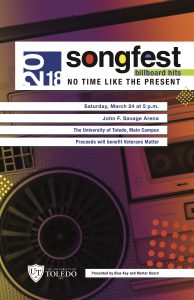 Songfest 2018 will be held 5 p.m. Saturday, March 24 in Savage Arena.
Songfest 2018 will be held 5 p.m. Saturday, March 24 in Savage Arena.
Songfest will have 21 student groups participating, and organizers hope to raise $25,000 for Veterans Matter.
Veterans Matter was founded in 2012 and is a rapid-response system partnered with the U.S. Department of Veterans Affairs’ Homeless Veterans program to allow homeless veterans to find housing. Money raised helps cover the deposit or first month’s rent so veterans can move in quickly. Today, Veterans Matter operates in 16 states as well as Washington, D.C.
“We chose Veterans Matter this year because the members of both Mortar Board National Honor Society and Blue Key National Honor Fraternity see the need for our local homeless veterans,” said Tayler Bowen, emcee for Songfest. “We decided there was a need to give back to those who gave so much for us.”
This year’s Songfest theme gives participants the opportunity to choose songs that were produced within the past decade.
“In the past, the theme has historically been based around older songs that were produced 10-plus years ago,” Bowen said. “We looked to get the organizations and community excited by only selecting songs from the past 10 years. We think this is a really fun change of pace for everyone and will keep everyone excited.”
Many hours of practice go into the weeks and months leading up to Songfest, and the performances have led to the event becoming one of the most highly anticipated of spring semester.
In addition to the musical numbers, Blue Key National Honor Fraternity and Mortar Board National Honor Society, the Songfest sponsors, hold their recognition and tapping ceremonies during the event.
“We look forward to sharing our beloved tradition with all students, faculty and staff, alumni and the rest of the Toledo community,” Bowen said. “People should be there to see the event come together and all of the hard work that the organizations have put into their performances.”
Olympic gold medalist to talk business March 22
Tuesday, March 20th, 2018John Naber, Olympic gold medal winner and sportscaster, will visit The University of Toledo to give the Edwin Dodd Distinguished Lecture Series in Business Ethics.
The public is invited to hear him speak 7 p.m. Thursday, March 22 in the Driscoll Alumni Center Auditorium.
Naber’s presentation is titled “Pursuing Victory With Honor.”
Sponsored by Dana Inc. and Owens-Illinois Inc., and co-hosted by the UT College of Business and Innovation, the College of Law, and the Jesup Scott Honors College, the event is free, but registration is requested at utoledo.edu/business/edwindodd.

John Naber
In 1976, Naber became the most highly decorated member of the U.S. Olympic Team, winning four gold medals and one silver, and setting four world records in the sport of swimming. In the process, he became the first swimmer in Olympic history to win two individual medals on the same day.
One year later, he led his school, the University of Southern California, to his and its fourth consecutive undefeated season and national title, and won the James E. Sullivan Award as the nation’s outstanding amateur athlete.
Moving to broadcasting, Naber worked for all the major networks and almost every cable channel covering his sport at local, national and international meets. In 1984, he was inducted into the U.S. Olympic Committee Hall of Fame, just two days before he carried the Olympic torch, and later the Olympic flag, into the Los Angeles Olympic opening ceremony. In 1986, Naber began working as a play-by-play announcer, covering sports as varied as motocross, skiing, gymnastics, football, bowling and equestrian events. He has hosted coverage for more than 30 different sports and for seven Olympic Games.
As a keen observer of excellence, Naber has discovered the method by which champions in all walks of life use to reach their goals, and he shares this process along with his personal insights to audiences all over the globe.
The Edwin Dodd Distinguished Lecture Series in Business Ethics celebrates the legacy of the late chairman, CEO and president of Owens-Illinois Corp. Established in 2003 through a collaborative effort led by the Dodd Family with partners Owens-Illinois and the Dana Corp., this fund was established as an enduring memorial to Dodd, spotlighting his work in the business world and the Toledo community. The purpose of the fund is to support the ongoing Distinguished Lecture Series in Business Ethics.
The fund is housed in the College of Business and Innovation and partners with both Dana Corp. and Owens-Illinois with representatives sitting on the planning committee, along with a member of the Dodd family, with the goal of leveraging national networks to identify and feature experts in the field on a biannual basis.
Science center CEO to discuss STEMM roles for women
Monday, March 19th, 2018Dr. Tonya Matthews, president and chief executive officer of the Michigan Science Center in Detroit, will give the keynote address as part of The University of Toledo’s celebration of Women’s History Month.
The free, public event is 6:30 p.m. Tuesday, March 20 in the Driscoll Alumni Center Auditorium.
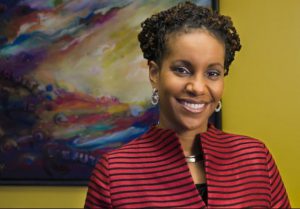
Dr. Tonya Matthews
Matthews was selected by Crain’s Detroit Business as one of the 100 most influential women in Michigan in 2016. She also was honored as a Michigan Chronicle Woman of Achievement for her act of inspiring others through vision and leadership, exceptional achievements, and participation in community service.
Since she was named president and CEO of the Michigan Science Center in 2013, Matthews has worked to increase female involvement within the fields of science, technology, engineering, math and medicine, known as STEMM. She has implemented several programs, including career exploration fairs, innovative professional development for teachers, and the STEMinista Project, an initiative supporting the science interest of middle school girls.
During her lecture, Matthews will discuss strong female leaders and their diverse management styles. She will provide emphasis on women in STEMM fields.
“I’m honored to participate in the Women’s History Month celebration at The University of Toledo,” Matthews said. “Women provide an important voice and perspective that is critical to innovation and progress. There is a need to better engage and encourage girls in STEMM and to support this need. It’s up to us to inspire the next generation of women scientists, engineers and innovators.”
Matthews also shares inspiration through poetry. She has published four poetry collections and is a Library of Congress Center for the Book honoree.
Danielle Stamper, interim program coordinator in the Office of Multicultural Student Success, believes Matthew’s lecture will be motivating to UT students.
“I believe that Dr. Tonya Matthews will encourage and empower women, especially women of color, to pursue STEMM careers,” Stamper said. “I am excited to hear from Dr. Matthews how her passions of poetry and writing have advanced her in the STEMM fields.”
Matthews received a bachelor’s degree in biomedical and electrical engineering from Duke University and a doctorate in biomedical engineering from Johns Hopkins University. She was a biomedical engineer for the U.S. Food and Drug Administration, and she worked at museums in Maryland and Ohio.
The event is sponsored by the Catharine S. Eberly Center for Women, the Office of Diversity and Inclusion, and the Office of Multicultural Student Success, with additional support from the Jesup Scott Honors College and the College of Natural Sciences and Mathematics.
UT scientists awarded $400,000 grant to study wildlife in Oak Openings region
Monday, March 19th, 2018A team of ecologists at The University of Toledo was awarded a two-year state wildlife grant from Ohio and Michigan to study flagship species of the Oak Openings region to better inform conservation and management strategies.
Using radio telemetry, Dr. Jeanine Refsnider, evolutionary ecologist and assistant professor in the UT Department of Environmental Sciences, and Dr. Henry Streby, ornithologist and assistant professor in the UT Department of Environmental Sciences, will focus on the productivity and survival of red-headed woodpeckers, eastern box turtles and spotted turtles particularly in the oak savanna and wet prairie habitats in northwest Ohio and southern Michigan.
The Ohio Department of Natural Resources and Michigan Department of Natural Resources are funding the work with a $400,000 grant through the U.S. Fish and Wildlife Service.
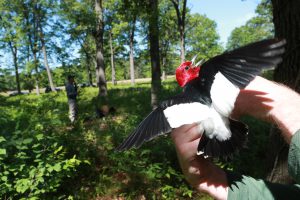 “Oak savanna and wet prairie habitats have drastically declined in this area during the last century,” Refsnider said. “We are interested in three flagship species of Oak Openings ecosystems. If they’re doing well, the ecosystem is probably doing well. But if the animals are there yet not successfully producing offspring, the populations will continue to decline and possibly go extinct. We want to give conservationists a powerful tool to optimize the landscape and maintain wildlife populations, and that requires knowing not just whether rare species are present, but also whether they are reproducing successfully.”
“Oak savanna and wet prairie habitats have drastically declined in this area during the last century,” Refsnider said. “We are interested in three flagship species of Oak Openings ecosystems. If they’re doing well, the ecosystem is probably doing well. But if the animals are there yet not successfully producing offspring, the populations will continue to decline and possibly go extinct. We want to give conservationists a powerful tool to optimize the landscape and maintain wildlife populations, and that requires knowing not just whether rare species are present, but also whether they are reproducing successfully.”
Work begins in the spring on the study, which is titled “Distribution, Density, and Demography of Red-headed Woodpeckers, Eastern Box Turtles, and Spotted Turtles in Oak Openings of Ohio and Michigan.”
“If the habitat is good for charismatic mega fauna, there’s a good chance it’s right for the whole system,” Streby said. “If it’s bad for one of these, it’s likely representing underlying problems for all species.”
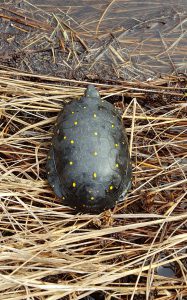
Spotted turtle
Radio transmitters will be epoxied to the turtles and harnessed to the woodpeckers. They do not inhibit the animal’s movement.
For all three species, UT researchers will be conducting distribution and density surveys, monitoring adults with radio-telemetry, monitoring nests, and tracking juveniles with radio-telemetry when they leave the nest.
Researchers will then use nest and juvenile survival data to determine which landscape compositions and configurations result in the best overall productivity for any species individually and all three together.
“We want to identify the recipe for a quality habitat and map where nests might have the highest success in getting what they need for a self-sustaining population,” Streby said. “The Oak Openings region is a complex patchwork of wetlands, uplands, thin forest, dense forest, prairie and wet prairie. This comprehensive study is necessary to demonstrate which parts of the habitat are working and inform conservation management in the future.”
Global Medical Missions Hall of Fame induction ceremony set for March 17
Thursday, March 15th, 2018The University of Toledo College of Medicine and Life Science’s Global Medical Missions Hall of Fame will induct a new class of honorees Saturday, March 17.
Inductees will be recognized during a ceremony at 7:30 p.m. in Collier Building Room 1000 on UT’s Health Science Campus.
Members of the 2018 class are Dr. Diane Cappelletty, Dr. Ziya Celik and International Samaritan.
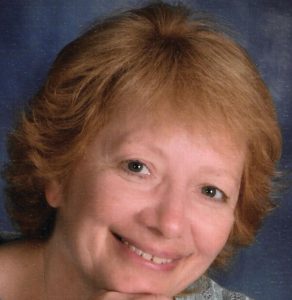
Dr. Diane Cappelletty
Cappelletty is a professor and chair of pharmacy practice in the UT College of Pharmacy and Pharmaceutical Sciences. The Monclova, Ohio, resident and UT alumna has been involved with medical missions and local medical clinics for 15 years.
Her mission work began in 2003 when she worked with a team in Peru. Since then, Cappelletty has been on numerous missions to Guatemala and Honduras, and has inspired students to serve alongside her. She compounds medications in the field, comes up with innovative techniques to provide meds during the missions, and mentors students, showing them the humanistic side of pharmacists in trying conditions. Her work has been recognized by the Ohio Society of Health System Pharmacists.
In Toledo, Cappelletty volunteers at the free Community Care Clinic, which, thanks to her efforts, was licensed by the Ohio State Board of Pharmacy.
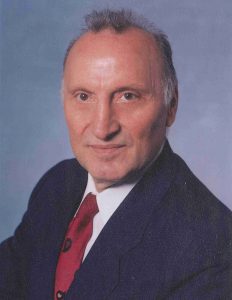
Dr. Ziya Celik
Celik is a surgeon who has participated in medical missions for more than three decades. He has worked with Midwest Medical Missions, Medishare and Medecins Sans Frontieres/Doctors Without Borders, serving in the Dominican Republic, Kenya, Haiti and Nigeria.
Born in 1941 in Rize, Turkey, Celik moved to the city of Erzurum to complete his early education. In 1960, he started medical school at the University of Istanbul, completed a surgery residency, and was an instructor at the University of Ataturk in Erzurum until 1971. In 1976, he completed a residency in general surgery at the former Medical College of Ohio.
In addition to medical missions and earthquake relief, Celik maintained a general surgery private practice in Oregon, Ohio, for 30 years, retiring in 2006. Affiliated with St. Charles Hospital, he was a 20-year member of its Executive Committee, director of surgery for 10 years and chief of staff while volunteering his surgical skills around the globe. He lives in Pompano Beach, Fla.
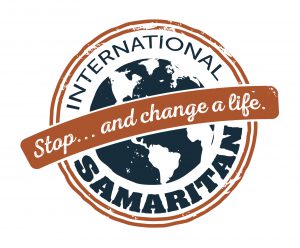 International Samaritan is a ministry based in Ann Arbor, Mich., which serves more than 13,000 people each year. For nearly two decades, this nonprofit organization has established programs to alleviate severe poverty and health issues in numerous countries.
International Samaritan is a ministry based in Ann Arbor, Mich., which serves more than 13,000 people each year. For nearly two decades, this nonprofit organization has established programs to alleviate severe poverty and health issues in numerous countries.
In 1994, Rev. Donald Vettese, a Jesuit priest who was then president of St. John’s Jesuit High School in Toledo, founded this ministry after a trip with students to an orphanage in Guatemala City. In 16 years, the ministry has started programs in Guatemala, Egypt, El Salvador, Honduras, Nicaragua, Panama and Haiti. The organization also is conducting feasibility studies for similar efforts in Ethiopia, Sierra Leone and the Philippines. Oscar Dussan, president of International Samaritan, will attend the ceremony to accept the award.
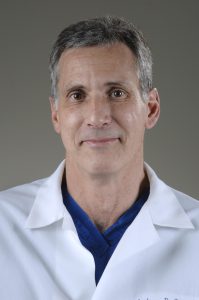
Dr. Andrew Casabianca
In addition, Dr. Andrew Casabianca, associate professor and chair of anesthesiology in the UT College of Medicine and Life Sciences and medical director of operative services at UT Medical Center, will receive the Dr. Lawrence V. Conway Lifetime Distinguished Service Award. He also is associate professor of surgery and dentistry.
Since traveling to the Dominican Republic on his first medical mission trip in 1994, Casabianca has returned every year. A member of the Midwest Medical Missions, he has participated in more than 30 trips, conducting primary care, anesthesia and dentistry. Casabianca has been the faculty adviser for UT Students for Medical Missions and is on the missions committee at Calvary Church in Maumee. He also was on the planning committee for Serve Week, participated in medical clinics for Vision Ministries and Convoy of Hope, and is a board member for Midwest Medical Missions.
RSVPs are requested for the free, public induction ceremony. Call 419.530.2586 or 1.800.235.6766, register online or email medmissionhof@utoledo.edu.
In conjunction with the induction ceremony, the College of Medicine Students for Medical Missions will host a symposium from 8:30 a.m. to 1:30 p.m. Saturday, March 17 in Health Education Building 110.
Speakers will include Cappelletty, Celik, Dussan and Casabianca. Register for the free symposium here.
Dr. Lawrence V. Conway, UT professor emeritus of finance, founded the Global Medical Missions Hall of Fame in 2004 to honor individuals and organizations that have made significant contributions to advancing the medical well-being of people around the world. In 2006, the Global Medical Missions Hall of Fame became affiliated with the UT College of Medicine and Life Sciences. The hall of fame can be seen in the lobby of the Jacobs Interprofessional Immersive Simulation Center.
Women & Philanthropy to donate 1,000 books to 2nd grade classrooms
Monday, March 12th, 2018Women & Philanthropy and the Judith Herb College of Education at The University of Toledo are donating approximately 1,000 books to Toledo Public Schools.
The books will be distributed to 33 second-grade classrooms at 19 TPS schools.
Marcy McMahon, the chair of Women & Philanthropy, and Dr. Romules Durant, TPS superintendent, will present the books to representatives of each school 10:30 a.m. Thursday, March 15 at Old Orchard Elementary School, 2402 Cheltenham Rd.
“Second grade is a critical year for learning to read,” said Dr. Thea Sawicki, chair of the Holiday Project for Women & Philanthropy and professor in the UT Department of Medical Microbiology and Immunology. “Choosing one grade to focus on allows us to support more schools.”
As part of its 2017 Holiday Project titled “Encouraging Early Literacy,” Women & Philanthropy partnered with the UT Judith Herb College of Education to raise funds to provide scholastic books for elementary classrooms in TPS schools. Women & Philanthropy will continue to raise funds throughout 2018 with the goal of donating books to all second-grade classrooms in each of the 40 TPS schools this year.
“Our faculty is deeply committed to working collaboratively with our school partners to improve early literacy,” said Dr. Virginia Keil, interim dean of the UT Judith Herb College of Education. “Our partnership with Woman & Philanthropy has allowed the college to work with TPS leaders to place high-interest books in second-grade classrooms. We hope that making books readily accessible to students will encourage reading and ultimately help to improve academic achievement.”
“We are incredibly grateful that the UT Judith Herb College of Education and Women & Philanthropy have chosen to support classrooms throughout TPS schools, including Old Orchard which is right in the neighborhood of the University,” Durant said. “As a College of Education graduate, I’m especially proud of this partnership to serve our students.”
Women & Philanthropy, which was founded in 2006, has gifted more than $424,000 in grants across the UT campus and has 80 active members consisting of both UT alumni and community members.
UT engineer creates solution to cheaper, longer lasting battery packs
Tuesday, March 6th, 2018An electrical engineer at The University of Toledo, who nearly died as a girl in Africa because of a hospital’s lack of power, has developed a new energy storage solution to make battery packs in electric vehicles, satellites, planes and grid stations last longer and cost less.
The new technology called a bilevel equalizer is the first hybrid that combines the high performance of an active equalizer with the low cost of the passive equalizer.

Dr. Ngalula Mubenga, assistant professor of electrical engineering technology at The University of Toledo, holding a battery cell next to the bilevel equalizer
“It’s a game changer because we solved the weak cell issue in lithium ion battery storage for packs with hundreds of cells,” said Dr. Ngalula Mubenga, assistant professor of electrical engineering technology at UT. “Whenever we are talking about batteries, we are talking about cells connected in a series. Over time, the battery is not balanced and limited by the weakest cell in the battery.”
Before the bilevel equalizer, battery makers and automotive manufacturers balanced the cell voltages in a large battery pack using either a passive circuit, which loses more energy, or an active circuit, which is 10 times more expensive.
“In spite of their significant losses, passive equalizers are used in most applications because they are relatively simple and low cost,” Mubenga said.
In Mubenga’s new technology, the cells are grouped into sections. Each cell within the section is balanced by a passive equalizer, while the entire section is balanced by an active equalizer.
“If there are 120 cells in a battery, divide the cells into 10 groups of 12,” Mubenga said. “Then you only need nine active equalizer units and 120 passive equalizer units using the bilevel equalizer. With current active equalizers, manufacturers would have to use 120 active equalizers. For manufacturers that can’t afford to use only active equalizers, the bilevel equalizer is the solution to the problem.”
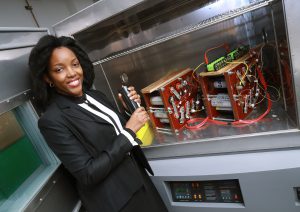 Experiments have shown that the bilevel equalizer increases the discharge capacity of lithium ion batteries by about 30 percent, and the pack lasts longer because the cells are balanced.
Experiments have shown that the bilevel equalizer increases the discharge capacity of lithium ion batteries by about 30 percent, and the pack lasts longer because the cells are balanced.
“Instead of an electric vehicle’s battery lasting only four years, it would last much longer,” Mubenga said.
Mubenga worked on the project with Dr. Tom Stuart, professor emeritus in the UT Department of Electrical Engineering and Computer Science, who had the idea for the bilevel equalizer.
Their team is licensing the hybrid equalizer and retrofit kit to manufacturers. The research was recently published in Batteries, an international journal. Project funding was provided by the Ohio I-Corps program and Ohio Third Frontier program.
Mubenga plans to present their new, patented technology at 2 p.m. Wednesday, March 7 at the Advanced Design and Manufacturing Expo at the Huntington Convention Center of Cleveland in a session titled “Lowering the Cost of Energy Storage for E/HV and Grid Applications Using a Bilevel Equalizer for Large Li-Ion Batteries.”
Mubenga understands the life-changing power of electricity. When she was 17 years old in her native country of the Democratic Republic of Congo in Africa, she waited three days for surgery after her appendix burst because there was no power at the hospital.
“I was living in a small town called Kikwit, far away from the big and beautiful capital city of Kinshasa,” Mubenga said. “I was very sick, doctors needed to do surgery, but they couldn’t find any gas to turn on the power generator. For three days, my life depended on electricity. I was praying. I could not eat. And decided if I made it alive, I would work to find a solution so people wouldn’t die because of lack of electricity.”
The hospital found fuel to power the generator, doctors did the surgery and Mubenga survived.
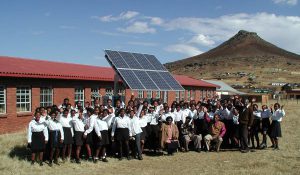
Solar panel serving a community in the Democratic Republic of the Congo
She started studying renewable energy at the UT College of Engineering in 2000 and earned a bachelor’s degree, master’s degree and PhD in electrical engineering. After earning her professional engineer license in Ohio, she went on to found her company called the SMIN Power Group, which develops and installs solar power systems in communities throughout the Democratic Republic of Congo.
“My passion is deep,” Mubenga said. “In places like that small town of Kikwit, if you have solar power, you can have electricity and save lives.”
Another factor fueling Mubenga’s research motivation is a connection between her native country and lithium ion batteries.
“Most of the minerals for today’s electronics are mined in the Democratic Republic of the Congo,” Mubenga said. “The Democratic Republic of the Congo is a leading producer of cobalt, copper, gold, diamond, tantalum and tin in the world. Indeed, the Democratic Republic of the Congo contains about 50 percent of the world’s reserve of cobalt, a mineral used to make lithium ion batteries.”
March UT Board of Trustees Meetings
Friday, March 2nd, 2018Wednesday, March 14, 2018
Driscoll Alumni Center, Schmakel Room
5:30 p.m. Board of Trustees Dinner
Monday, March 19, 2018
Mulford Library, Board Room
4 p.m. Privileging and Credentialing Sub-Committee Meeting
This Sub-Committee will enter Executive Session immediately upon convening the meeting to discuss privileged information related to the evaluation of medical staff personnel appointments.
Thursday, March 29, 2018
Radisson Hotel, 3100 Restaurant
8 a.m. Board of Trustees Breakfast
Any questions may be directed to the Office of University Communications by calling 419.530.2410 or via email to meghan.cunningham@utoledo.edu.

